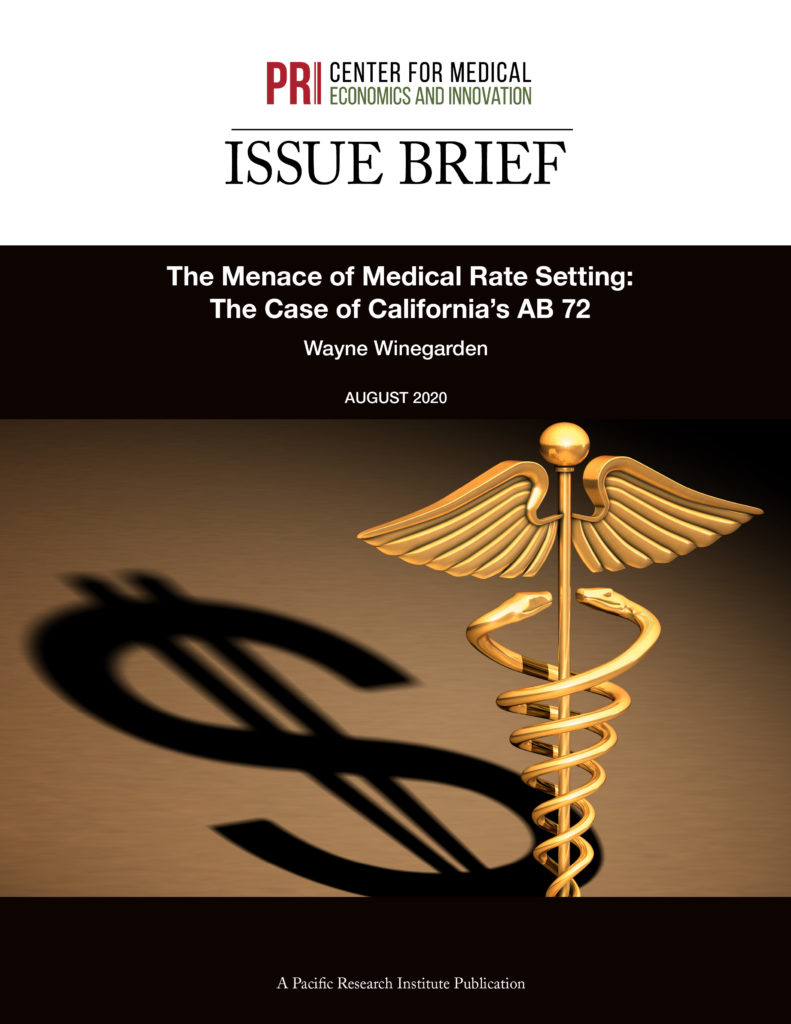NEW BRIEF: Impact of California’s Surprise Medical Billing Law: Lower Quality Care, Reduced Access, Higher System Costs
 SAN FRANCISCO – California’s surprise medical billing law (Assembly Bill 72) – which imposes price controls on the rates out-of-network physicians can charge at in-network facilities – is hurting patients with lower quality care, reduced access, and higher health care system costs, finds a new brief released today by the Center for Medical Economics and Innovation at the Pacific Research Institute.
SAN FRANCISCO – California’s surprise medical billing law (Assembly Bill 72) – which imposes price controls on the rates out-of-network physicians can charge at in-network facilities – is hurting patients with lower quality care, reduced access, and higher health care system costs, finds a new brief released today by the Center for Medical Economics and Innovation at the Pacific Research Institute.
Click here to download the brief
“California’s surprise medical billing law has created unintended consequences that are increasing healthcare costs and reducing quality,” said Dr. Wayne Winegarden, director of PRI’s Center for Medical Economics and Innovation and the brief’s author. “Price controls have led to fewer doctors on call in emergency rooms, and independent doctor practices consolidating into bigger hospitals. When government puts its thumb on the scale, it’s ultimately patients that are hurt the most.”
In “The Menace of Medical Rate Setting: The Case of California’s AB 72,” Winegarden writes that early evidence from the law’s first three years of implementation shows that it is narrowing patient provider networks and accelerating provider consolidation. He argues these initial developments from the law will further decrease the quality of health care and increase system costs in the years to come.
Winegarden cites data from a California Medical Association survey of medical professionals, in which 62 percent of those surveyed said the new law created access issues for their patients, and 79 percent said it reduced the availability of emergency and on call physicians.
The study references data from the California Department of Managed Health Care, which shows the number of patients complaining about access to health care spiked in 2018 – the first year the law was implemented. Complaints rose even further in 2019.
He also makes the case that the law is encouraging more provider practice consolidation, as the price controls in AB 72 put smaller health care providers at a disadvantage in negotiations with insurers because they can ultimately hold out for the 125 percent of Medicare rate set in the law. AB 72 is encouraging more consolidation of independent doctor practices with larger hospitals to improve their negotiating standing. However, it is also leading to the creation of health care monopolies, especially in rural areas and communities that are undeserved by the health care system, which inevitably results in fewer choices and higher system costs.
To ensure that patients don’t experience the problems of surprise medical billing, Winegarden recommends reforming the system to increase transparency through “truth in advertising” requirements on health facilities and insurers. This reform would protect patients and ensure fair negotiations between insurers, health facilities, and doctors, without the government price controls imposed in AB 72.
“California’s surprise medical billing law should serve as a warning for Congress and other states – the negative impacts from this law are just beginning and will likely worsen the quality and availability of care in the coming years,” said Winegarden. “But by embracing free market reforms to increase transparency, we can address the surprise billing problem and improve health care efficiency, without incurring the large costs and harm to patients that come from government price controls.”

